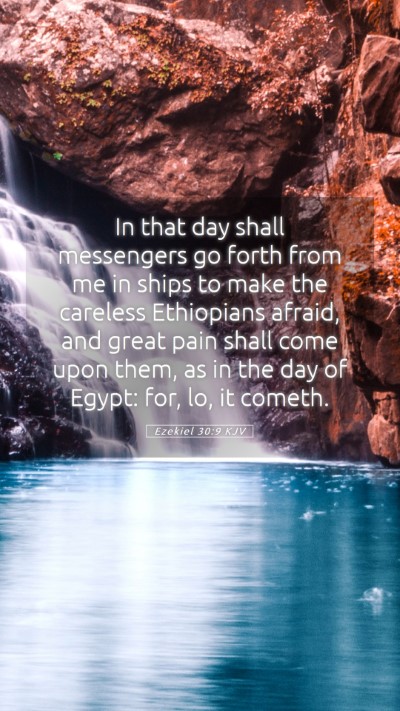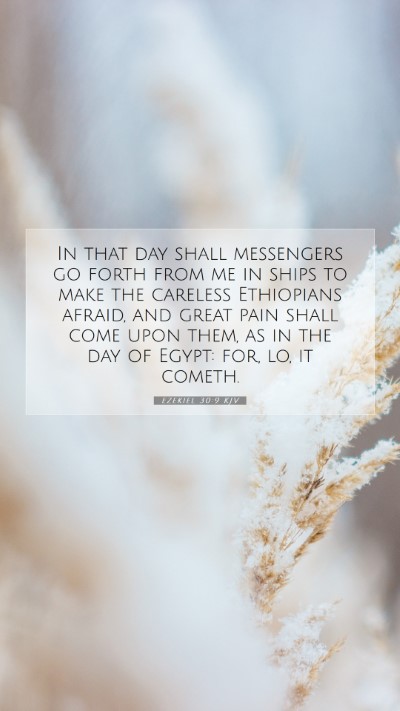Ezekiel 30:9 - Bible Verse Explanation and Interpretation
Ezekiel 30:9 states, "In that day messengers shall go forth from me in ships to make the careless Ethiopians afraid, and great anguish shall come upon them, as in the day of Egypt: for, lo, it cometh." This verse holds significant meaning within its context as it addresses the impending judgment upon Egypt and its allies.
Contextual Analysis
To fully grasp the meaning of Ezekiel 30:9, we need to explore the context surrounding this prophecy. The Book of Ezekiel, attributed to the prophet Ezekiel, is filled with visions and messages of warning and judgment, particularly focused on the nation of Israel and neighboring nations, including Egypt. The prophecy in this verse is a part of Ezekiel's broader declaration against Egypt (Ezekiel 29-32).
Biblical Exegesis
The deliverance of a message in this verse signifies God's sovereignty and the means through which He communicates judgment. The use of ships as the medium for messengers suggests a sense of approaching calamity carried over vast waters, evoking the notion of inescapable doom.
- Messengers in Ships: This symbolizes the urgency and far-reaching impact of the prophecy. Ships, often associated with trade and travel, here represent the spread of fear and warning to distant lands, particularly the Ethiopians who are seen as distant observers of Egypt's downfall.
- Careless Ethiopians: The description of the Ethiopians as "careless" indicates their complacency and lack of awareness regarding the dangers that were approaching. This reflects a common biblical theme where nations are warned before the judgment comes.
- Great Anguish: The sorrow depicted emphasizes the severe repercussions of Egypt's alliances and ungodly practices, serving as a forewarning to their neighbors, particularly in how their fates are intertwined.
Insights from Notable Commentaries
Drawing from the insights of various biblical scholars enhances our understanding of this verse:
Matthew Henry's Commentary
Matthew Henry interprets this verse as a warning not only to Egypt but also to those who place their trust in its security. His emphasis is on the predominant theme of God's judgment, where He utilizes even foreign enemies to execute His plans. He highlights the prophetic voice that calls nations to recognize their vulnerabilities amidst divine intervention.
Albert Barnes' Notes
Albert Barnes focuses on the metaphor of messengers navigating ships, interpreting this as a foreshadowing of the speed with which God’s messages reach those affected by His judgments. He underscores that fear will permeate the hearts of nations that once felt secure in their alliances with Egypt, correlating it to the historical context of Egypt's own downfall.
Adam Clarke's Commentary
Adam Clarke elaborates on the emotional aspect of the prophecy, linking the “great anguish” to the historical turmoil was experienced during the Exodus. He provides a deeper insight into the psychological impact of such devastation on neighboring nations. His commentary illustrates the parallel fears invoked by the devastation portrayed in the context of God's righteous judgment.
Application of the Verse
Understanding Ezekiel 30:9 provides valuable lessons for contemporary readers:
- The Importance of Vigilance: This verse encourages believers to remain vigilant and aware of spiritual and moral complacency.
- Recognition of God’s Sovereignty: It serves as a reminder that God is ultimately in control of nations and their fates.
- Judgment and Mercy: While great anguish can be a consequence of disobedience, God's messages of mercy continue to resonate throughout history.
Cross References
To further explore the themes of judgment and divine sovereignty, consider the following cross-references:
- Isaiah 18:1-2: A proclamation against Ethiopia, reminding us of God's broader plan for nations.
- Jeremiah 46:1-2: Further insights into God’s judgments against Egypt.
- Ezekiel 29:6-7: God's message of judgment prior to the events in chapter 30.
Conclusion
In conclusion, Ezekiel 30:9 encapsulates a chilling prophecy of judgment that extends beyond Egypt to the nations surrounding it, particularly the complacent Ethiopians. Through a combination of powerful imagery and urgent declarations, this passage emphasizes God's sovereignty and the inevitability of His judgments when humanity strays from righteousness. For those studying the Bible, this verse serves as a poignant reminder of the themes of accountability, the role of prophetic voices, and the expectation of divine intervention in human affairs.


